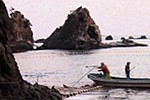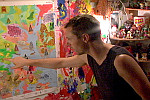 Shadows off the beaten path
Shadows off the beaten pathVANISHING OF THE BEES | WE LIVE IN PUBLIC
< < D O C S > >
last update 22.Oct.09
See also: SHADOWS FILM FESTIVAL
 R E V I E W B Y R I C H C L I N E
R E V I E W B Y R I C H C L I N E MUST
MUST  SEE
SEE
scr Mark Monroe
prd Paula DuPre Pesman, Fisher Stevens
with Ric O'Barry, Roger Payne, Louie Psihoyos, Paul Watson, Mandy-Rae Cruikshank, Kirk Krack, Dave Rastovich, Charles Hambleton, Ian Campbell, Jim Clark, Isabel Lucas, Hayden Panettiere
 release US 31.Jul.09,
release US 31.Jul.09, UK 23.Oct.09
09/US 1h32
 Funded by the Oceanic Preservation Society, this film virtually creates a new genre: the horror doc. It's a gripping and compelling film about something utterly unthinkable. And it makes a superb companion piece to the milder (but no less important) THE END OF THE LINE.
Funded by the Oceanic Preservation Society, this film virtually creates a new genre: the horror doc. It's a gripping and compelling film about something utterly unthinkable. And it makes a superb companion piece to the milder (but no less important) THE END OF THE LINE.
Ric O'Barry is the man who caught and trained the dolphins for the 1960s TV series Flipper. And when one of them committed suicide due to the stress of captivity, he dedicated his life to freeing dolphins. As he explains, these are sentient beings whose social structures and playful natures are destroyed by being held in tanks. And over the years his attention has focussed on the town of Taiji, Japan, where many of the world's trained dolphins are caught. But even worse, the dolphins that don't make the cut are taken into a cove and pointlessly slaughtered.
Most of this documentary had to be shot using covert methods, which get increasingly complex as the filmmakers try to get footage from this top-secret cove where some 23,000 dolphins are killed annually. Along the way we meet experts, politicians, sportsmen and activists, all of whom have something important to add. The big questions loom heavily: why isn't Greenpeace pressuring Japan's government about this? Why is the International Whaling Commission (dolphins are a whale species) letting this happen unchallenged?
As this extremely thorough and balanced film lays out the facts, it becomes clear that the only way to stop this is to expose it, and a massive espionage operation pulls us in with its sheer entertainment value. There are high-tech cameras and microphones, highly skilled free-divers and special effects camera-hiding rocks made by George Lucas' special effects company. Meanwhile, O'Barry and friends are followed and threatened wherever they go.
Local fishermen argue that dolphin-killing is a cultural tradition (cut to the horrified Japanese public), while politicians say that the meat is served in schools (even though it's actually toxic with mercury poisoning). But nothing argues more loudly than the footage itself, which is simply horrifying in its sheer brutality. It's bad enough that the Japanese government has essentially bought the whaling commission while indulging in rampant false propaganda. But no other country has an excuse for letting this happen.
12.Aug.09
 R E V I E W B Y R I C H C L I N E
R E V I E W B Y R I C H C L I N E
with Art Chantry, Brian Chippendale, Rob Jones, Connie Collingsworth, Jim Madison, Coby Schultz, Barry Ament, Tyler Stout, Charlie Hardwick, Clayton Hayes, Tom Hazelmyer, Rock Forbes

release Can 13.Nov.08,
US 17.Jul.09, UK 9.Oct.09
08/Canada 1h35
 This documentary examines the dying art of rock music posters, which have had a huge effect on the world of graphic design. It's a visually stunning film, even if the subject matter isn't hugely compelling.
This documentary examines the dying art of rock music posters, which have had a huge effect on the world of graphic design. It's a visually stunning film, even if the subject matter isn't hugely compelling.
Rock posters burst onto the scene in the early 1980s with provocative images designed to grab attention and offend everyone but the fans. Sparked by punk rock and the counter-culture movement, these irreverent posters feature inventive, rough-hewn images and are often hand-crafted by enthusiastic fans who plaster them all over walls and poles, creating an anarchic street culture and often making the band look cooler than it is. The film interviews the geeks who designed these posters, looking back at the glory days of an art form that's disappearing.
Director Yaghoobian assembles the movie with wit and invention, capturing the scruffy texture of screen-print art with lurid colours and clever sound mixing. And the colourful interviewees are engagingly obsessive fans who love working at the grass roots to support bands by coming up with the most eye-catching artwork. They're also painfully aware that this style of poster isn't as compatible with music today as in the rock 'n' roll heyday. So they nostalgically indulge in their private collections (Hayes is creating an exhaustive poster archive in his online Gigposters community).
While it's fascinating to see the origins of these vibrant posters, many of which subvert political, religious and corporate icons, the film cuts around randomly, with little context or relevance. There isn't a central figure we can hang onto; everyone gets equal time, which leaves the film feeling a bit aimless. A terrific montage tracing the printing process, drenched in blood-red ink, is particularly impressive, but the whole film would have benefitted from an overall narrative framework.
That said, this is a lively and entertaining collection of small sequences and visceral colour. Yaghoobian uses effectively offbeat camerawork and snappy editing, playing with graphic design and capturing the tiny obsessions of these nerdy designers, which adds amusing insight to each interview. And even though the meandering structure loses us, there's plenty of visual stimulation along the way. And a lot of extremely cool posters we'd love to get our hands on.
15.Sep.09
 R E V I E W B Y R I C H C L I N E
R E V I E W B Y R I C H C L I N E
narr Emilia Fox
with David Hackenberg, Dave Mendes, Bret Adee, Denis vanEnglesdorp, Mary-Anne Frazier, Michael Pollan, Jeffrey Pettis, Rick Smith, Jay Feldman, Gunther Hauk, Bee Wilson, Marguerite Rigoglioso
 release UK 9.Oct.09
release UK 9.Oct.0909/UK 1h37
 With an especially important message and a clear sense of hope, this documentary is both fascinating and intensely relevant. And despite the wobbly filmmaking, the facts get through and demand attention.
With an especially important message and a clear sense of hope, this documentary is both fascinating and intensely relevant. And despite the wobbly filmmaking, the facts get through and demand attention.
Around the world, millions of bees are mysteriously disappearing, mainly in America where beekeeping has become a major industry. The sudden collapse of hives is extremely worrying due to the potentially calamitous effects: a third of the food we eat depends on bees. Digging into the story, the culprit turns out to be systemic pesticides. Banned in France after beekeepers protested, they are still being used in other nations as the chemical companies insist they are safe (they do their own extremely limited testing) and governments refuse to take them on.
Yes, the solution to this potentially horrific problem is obvious. And hopefully this film will put pressure on politicians to stand up to the corporations who are carelessly undermining the food chain for profit. Of course, these are the same corporations who fund the politicians, which explains all the feet-dragging over the years, despite overwhelming evidence.
The facts are strong enough to overcome this rather simplistic documentary. Choppy editing, cheap-looking animation, cheesily emotive music and a repetitive structure are actually minor problems; the real problem is the condescending, schoolmarm-ish narration, which continually states the obvious as if viewers are all 4 years old and have never heard of a bee before. At least this is balanced by astute comments from professional beekeepers, scientists and activists, plus a witty use of clips from the likes of The Simpsons and The Happening.
More persuasive is the righteous anger that wells up as we realise that all of this is due, yet again, to humans meddling with nature. And besides the insidious pesticides, there are farming methods that violate the earth's balance, transporting bees around the world as if they're merely cargo, harsh practices that manipulate honey production and, worst of all, the fact that corporations control America's Environmental Protection Agency, which one interviewee hilariously calls a bunch of "pestitutes". It's a pity the film isn't more sharply assembled than this; but we still get the message.
21.Sep.09
 R E V I E W B Y R I C H C L I N E
R E V I E W B Y R I C H C L I N E
prd Keirda Bahruth, Ondi Timoner
with Josh Harris, Tom Harris, Jon Harris, Tanya Corrin, Jason Calacanis, Douglas Rushkoff, Alana Heiss, Cal Chamberlain, Bob Simon, Brett Brewer, Chris DeWolfe, Anthony Haden-Guest
 release US Jan.09 sff,
release US Jan.09 sff, UK 13.Nov.09
09/US 1h30
SUNDANCE FILM FEST


 In documenting the story of one of the internet's chief innovators, filmmaker Timoner explores the profound way online communities have changed Western society. It's a fast-paced, entertaining movie, and it really makes us think.
In documenting the story of one of the internet's chief innovators, filmmaker Timoner explores the profound way online communities have changed Western society. It's a fast-paced, entertaining movie, and it really makes us think.
The world was a different place in 1984 when computer geek Josh Harris arrived in New York and saw the potential of the world wide web. Way ahead of his time, he rode the first wave of financial success with his company Jupiter, and he launched an interactive TV site, Pseudo, long before anyone invented broadband. In 1999, his We Live in Public project featured a 30-day performance art piece called Quiet, a closed community of artists whose every moment was videotaped.
The film follows the sparky and somewhat enigmatic Josh from his childhood, much of which was spent in front of a TV (he is still obsessed with Gilligan's Island), through several fortunes and a couple of bankruptcies. From the beginning, knew the internet would eliminate privacy. And he experienced this personally when, shortly after Quiet, he installed 32 cameras in his apartment so the world could watch his life with his girlfriend Tanya. The result was that he and Tanya start to drift apart even as they become closer to their online chatters.
In other words, the web has convinced us to trade real relationships for virtual ones, selling our privacy to achieve a connection with people we don't really know. And as he predicted back in the 1980s, everyone will eventually lose their privacy altogether. Already, companies use the words we type into private emails to target us with ads. And this information is available to anyone who's willing to pay.
Josh's story is narrated through interviews with his brothers Tom and Jon, other web experts, performance artists, journalists, financiers and even MySpace founders Brewer and DeWolfe. And Timoner also packs the film with sometimes too-real situations, most notably in the rather raucous footage from Quiet. As Josh observes, when he was younger, being on camera meant you were someone important, it was a way of validating yourself. But now, everyone can be seen by the whole world whenever they want. So where will the next generation go to feel special?
17.Oct.09


See also: SHADOWS FILM FESTIVAL
© 2009 by Rich Cline, Shadows
on the Wall